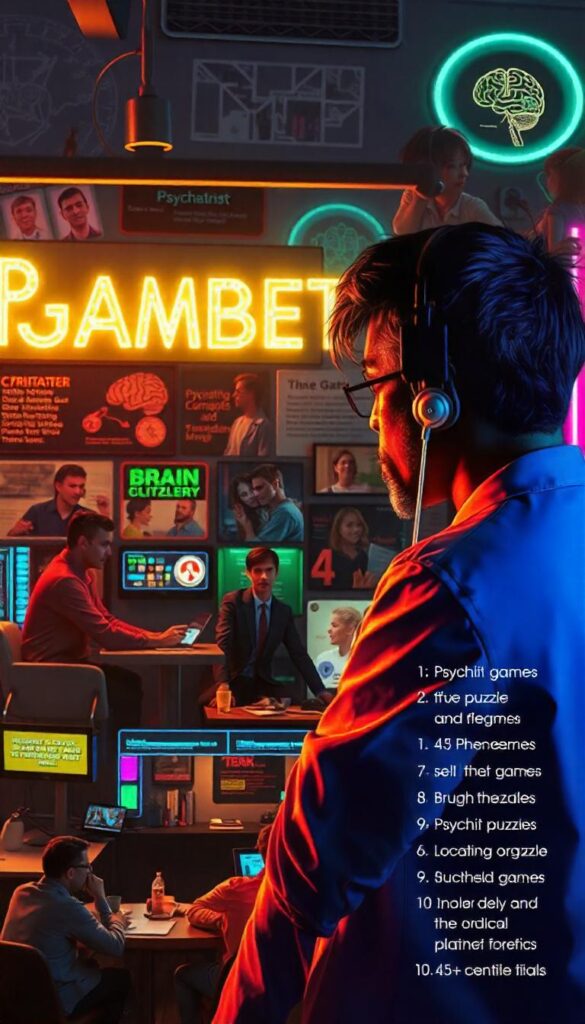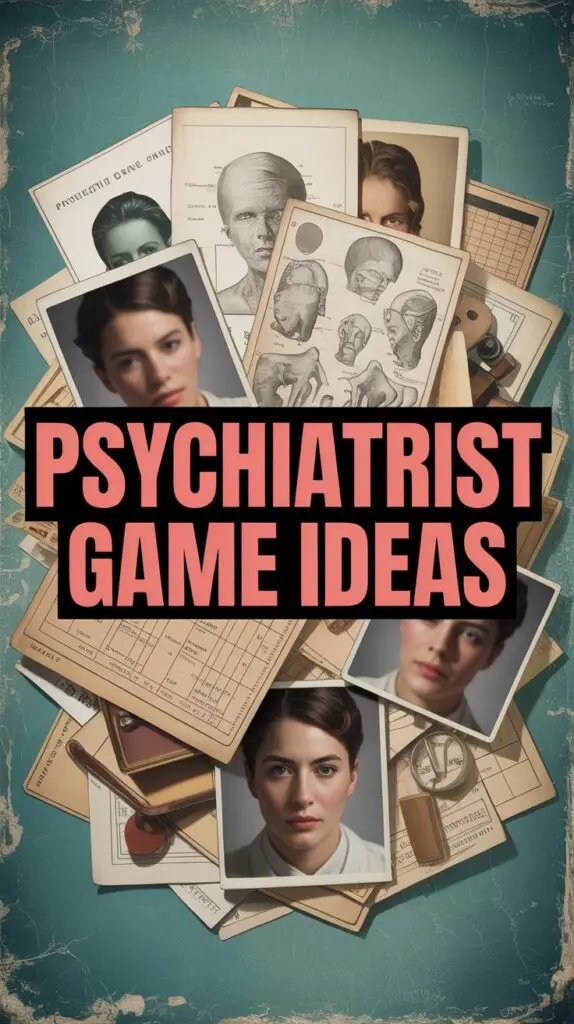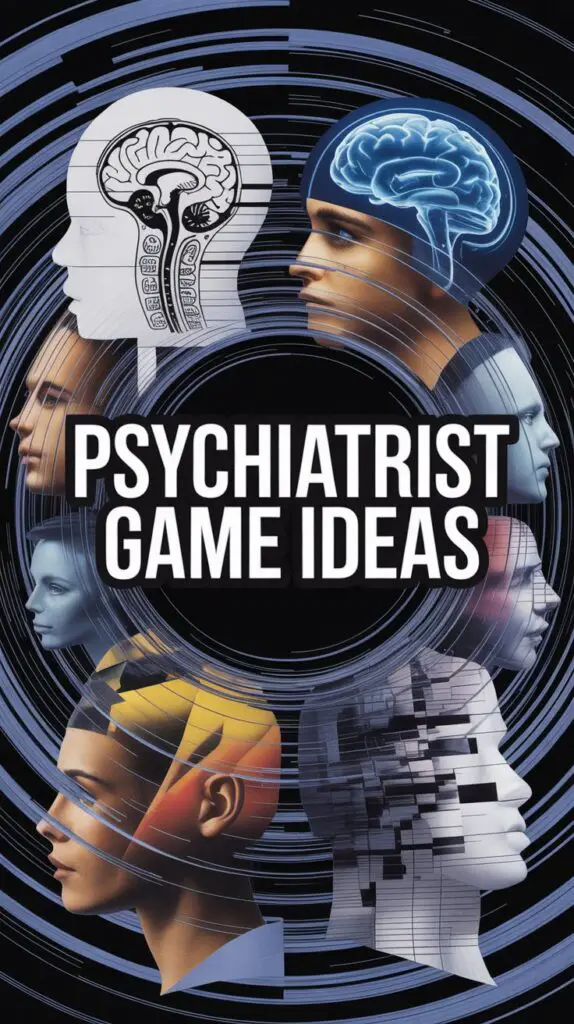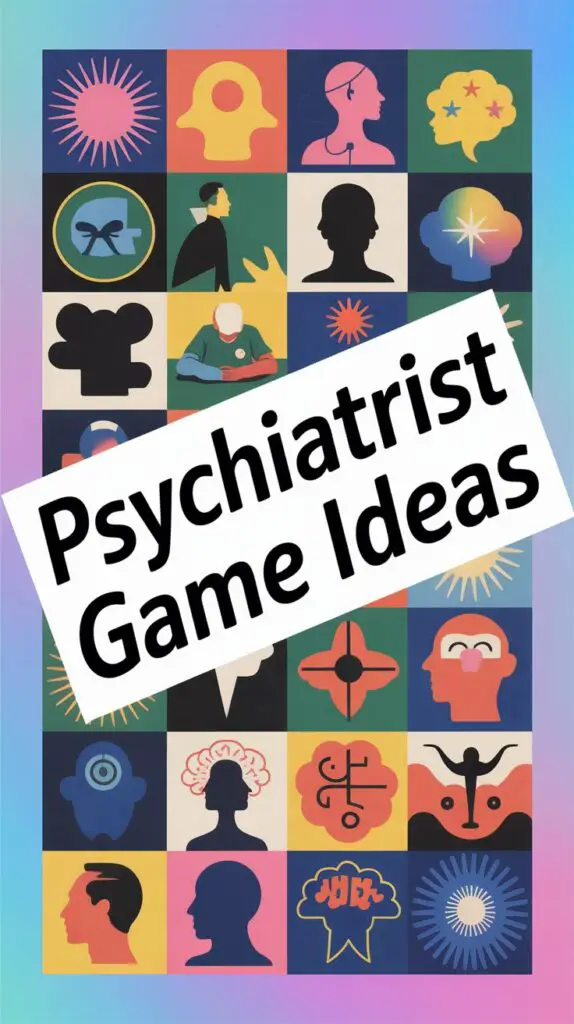Psychiatrist Game Ideas – Psychiatrist games are fun, interactive, and engaging activities that encourage players to think creatively while fostering teamwork. Typically, one player takes on the role of a “psychiatrist” while others assume unique or quirky roles without revealing them. The goal for the psychiatrist is to guess the unusual behaviors or roles of the group based on their interactions and clues. One popular version involves assigning participants bizarre characteristics, such as pretending to be an animal or having a strange accent, and the psychiatrist must ask yes-or-no questions to uncover these traits.
Related Post –
Another variation is the “role reversal” game, where participants must switch their behaviors every time the psychiatrist asks a question. These games are excellent for ice-breaking sessions, team-building exercises, or simply as a humorous and light-hearted challenge for a group of friends. The fun lies in the psychiatrist’s efforts to crack the puzzle while the participants remain in-character, often leading to unexpected and hilarious outcomes.
Psychiatrist Game Ideas
Here’s a list of 100+ Psychiatrist Game Ideas to keep things fun and engaging for your group:
- Pretend to be an animal.
- Speak only in rhymes.
- Act like you’re always excited.
- Have a secret identity.
- Speak with a different accent (e.g., British, Southern).
- Pretend you’re a famous celebrity.
- Talk like a pirate.
- Act like you’re perpetually cold.
- Speak like you’re very old.
- Act like you’re constantly surprised.
- Pretend you’re a robot.
- Act like you’re a detective.
- Pretend you’re a superhero.
- Act like a character from a cartoon.
- Pretend you’re a time traveler.
- Speak only in questions.
- Act like a very sophisticated person.
- Pretend you’re always embarrassed.
- Speak like a politician.
- Pretend you’re allergic to something.
- Act like you’ve just woken up.
- Pretend you’re in a job interview.
- Pretend you’re a judge in a courtroom.
- Act like you’re a spy.
- Pretend you’re an animal whisperer.
- Speak in a monotone voice.
- Pretend you’re afraid of everything.
- Speak in one word sentences.
- Act like you’re in a soap opera.
- Pretend you’re a child.
- Act like you’re walking on a tightrope.
- Pretend you’re a villain in a movie.
- Speak like you’re on a reality TV show.
- Pretend you’re a fortune teller.
- Act like you’re a genie in a bottle.
- Pretend you’re a professional athlete.
- Speak like a robot malfunctioning.
- Pretend you’re always hungry.
- Act like you’re in a cooking show.
- Pretend you’re a tour guide.
- Act like you’re a famous singer.
- Pretend you’re on a space mission.
- Speak in reverse (e.g., “Hello” becomes “Olleh”).
- Pretend you’re invisible.
- Act like a game show contestant.
- Pretend you’re a movie director.
- Speak in song lyrics.
- Act like you’re very clumsy.
- Pretend you’re a fashion model.
- Speak like you’re giving a motivational speech.
- Pretend you’re a reporter interviewing people.
- Act like you’re a detective solving a mystery.
- Speak in a whisper.
- Pretend you’re a king or queen.
- Act like you’re walking through a haunted house.
- Pretend you’re a scientist working on a new invention.
- Act like you’re a surgeon in the operating room.
- Pretend you’re an opera singer.
- Speak in animal sounds.
- Act like you’re afraid of a specific object.
- Pretend you’re a ghost.
- Act like you’re having a bad day.
- Speak in alliterations (e.g., “Peter Piper picked…”).
- Pretend you’re a mad scientist.
- Speak like a teacher giving a lesson.
- Pretend you’re a baby.
- Act like you’re always angry.
- Pretend you’re a country singer.
- Speak in Shakespearean English.
- Act like you’re an archaeologist uncovering treasures.
- Pretend you’re a lifeguard.
- Speak like a robot with a malfunction.
- Pretend you’re a rich aristocrat.
- Act like you’re royalty in medieval times.
- Speak in a very high-pitched voice.
- Pretend you’re in an action movie chase scene.
- Act like you’ve just won a major award.
- Speak in a whispering voice.
- Pretend you’re a teacher lecturing a class.
- Act like you’re a doctor giving advice.
- Pretend you’re a circus performer.
- Speak in a deep, mysterious voice.
- Pretend you’re the worst waiter at a restaurant.
- Act like you’re a famous artist creating a masterpiece.
- Pretend you’re an astronaut landing on a new planet.
- Speak in exaggerated gestures.
- Act like you’re a medieval knight.
- Pretend you’re an Olympic athlete.
- Speak like you’re a pirate giving orders.
- Pretend you’re in a scary movie.
- Act like you’re constantly on the phone.
- Pretend you’re an expert in a weird topic.
- Act like you’ve lost your memory.
- Pretend you’re a robot in training.
- Speak like you’re a professional wrestler.
- Pretend you’re on a safari.
- Act like you’re an undercover agent.
- Pretend you’re an art critic.
- Speak like you’re casting a spell.
- Pretend you’re on a game show where you have to guess words.
- Act like you’re trying to fix an imaginary broken machine.
- Pretend you’re a secret agent reporting a mission.
- Speak like you’re the host of a cooking show.
- Act like you’ve discovered an amazing treasure.
- Pretend you’re in an adventure movie, exploring the jungle.
- Act like you’re extremely bored.
- Pretend you’re an antique dealer.
- Speak like you’re trying to keep a secret.
- Act like you’ve just been told an unbelievable joke.
- Pretend you’re a personal trainer at the gym.
This list offers an extensive variety of fun roles and behaviors that can spark creativity in a Psychiatrist game. The psychiatrist will have to ask clever questions to identify these unique traits!
How to play
Pretend to be an Animal
- How to Play: Each player takes on the role of a specific animal and acts out its behaviors (e.g., a cat, dog, or lion). They must move, sound, or react like their chosen animal without revealing it directly.
- Helpful For: Encourages creativity and helps with breaking out of usual behavioral patterns. It’s great for building empathy and understanding different perspectives.
2. Speak Only in Rhymes
- How to Play: Players must speak in rhymes while interacting. For example, if someone asks, “How are you?” the answer must rhyme, like “I’m fine, I’m feeling divine!”
- Helpful For: Stimulates language skills, quick thinking, and enhances focus. It’s also a fun way to get people to think outside the box.
3. Act Like You’re Always Excited
- How to Play: Everyone acts like they’re overly excited about every situation, even mundane ones. They must express everything with high energy and enthusiasm.
- Helpful For: It boosts energy and creates a lively atmosphere. This game is useful for improving mood and overcoming shyness.
4. Have a Secret Identity
- How to Play: Players assume a secret identity and behave according to that persona. They may be given a backstory or invent their own secret character.
- Helpful For: It enhances imagination and adaptability. It also fosters problem-solving skills as players need to interact while maintaining their identity.
5. Speak with a Different Accent
- How to Play: Players must speak using a different accent (British, Southern, Australian, etc.) for the duration of the game. The psychiatrist has to guess the accent.
- Helpful For: This improves vocal variety and can boost confidence in speaking. It’s also a fun way to practice language skills.
6. Pretend You’re a Famous Celebrity
- How to Play: Players act as if they are famous celebrities, mimicking their mannerisms, speech patterns, or behaviors. They can choose any celebrity they like.
- Helpful For: This fosters self-expression and boosts creativity. It’s also great for practicing confidence and public speaking.
7. Talk Like a Pirate
- How to Play: Everyone adopts the persona of a pirate, using pirate slang and mannerisms (e.g., “Arrr, matey!”). They interact with each other while staying in character.
- Helpful For: It’s a fun way to practice creativity, humor, and group interaction. It also helps people loosen up and be playful.
8. Act Like You’re Perpetually Cold
- How to Play: Players must behave as though they are freezing cold, reacting to everything with shivering and trying to stay warm.
- Helpful For: It increases physical awareness and can help people become more expressive. It’s also a good way to get people to laugh and relax.
9. Speak Like You’re Very Old
- How to Play: Players must act like elderly people, with slower movements, hunched posture, and speech patterns typical of older adults.
- Helpful For: This encourages empathy and can be insightful for understanding different life stages. It also promotes awareness of how we perceive age.
10. Act Like You’re Constantly Surprised
- How to Play: Players must act surprised by everything that happens, reacting with wide eyes and exclamations of surprise for every little thing.
- Helpful For: It helps with engaging creativity and over-the-top expression. It’s great for boosting energy and spontaneity.
11. Pretend You’re a Robot
- How to Play: Players speak and move stiffly, like a robot, using monotone voices and mechanical movements.
- Helpful For: This is a fun way to practice control over speech and movements, and it can help with focusing attention.
12. Act Like You’re a Detective
- How to Play: Players assume the role of detectives, observing their surroundings and questioning others as if solving a mystery.
- Helpful For: It enhances analytical thinking, problem-solving, and observational skills. It also builds communication.
13. Pretend You’re a Superhero
- How to Play: Players act like superheroes, taking on a specific persona and exhibiting superhero traits like super strength or speed.
- Helpful For: It boosts confidence, imagination, and teamwork. It’s also a good way to get people energized and creative.
14. Act Like a Character from a Cartoon
- How to Play: Players take on the persona of a cartoon character, mimicking their voice, actions, and quirks.
- Helpful For: Encourages fun, creativity, and humor. It also helps with expressing emotions and mimicking different behaviors.
15. Pretend You’re a Time Traveler
- How to Play: Players act as though they have traveled from the past or future, adapting their speech and behavior to reflect the time period they’ve come from.
- Helpful For: It fosters creative thinking and historical knowledge. It also encourages empathy as players step into different time periods.
16. Speak Only in Questions
- How to Play: Players must communicate by asking only questions. For example, if someone asks “How are you?” you must respond with another question like, “How do you think I am?”
- Helpful For: This game stimulates quick thinking and sharpens communication skills. It encourages players to listen carefully and think on their feet.
17. Act Like a Very Sophisticated Person
- How to Play: Players must speak and act as though they are very refined, with proper manners, formal language, and graceful movements.
- Helpful For: It builds awareness of social behavior and etiquette, encouraging more controlled and thoughtful interactions.
18. Pretend You’re Always Embarrassed
- How to Play: Players react to every situation as if they are embarrassed, using shy body language and avoiding eye contact.
- Helpful For: It’s an excellent way to practice empathy and also helps with social understanding and interaction.
19. Speak Like a Politician
- How to Play: Players must speak in a formal, diplomatic manner like a politician, often using complex sentences and non-committal language.
- Helpful For: This enhances communication skills and can help with thinking critically about language and persuasion.
20. Pretend You’re Allergic to Something
- How to Play: Players act as though they are allergic to something in the room, reacting with exaggerated symptoms like sneezing, itching, or discomfort.
- Helpful For: This game encourages attention to detail and emotional expression. It also helps with spontaneous reaction to situations.
21. Act Like You’ve Just Woken Up
- How to Play: Players act groggy and disoriented, as though they’ve just woken up from a deep sleep.
- Helpful For: It helps with building a connection to physical actions and expressing tiredness or confusion in an exaggerated way.
22. Pretend You’re in a Job Interview
- How to Play: Players take turns pretending to be the interviewer or the interviewee, answering questions in a formal manner as if they are applying for a job.
- Helpful For: It builds confidence, improves communication skills, and helps with public speaking and job interview preparation.
23. Pretend You’re a Judge in a Courtroom
- How to Play: Players act as a judge, presiding over a mock trial, making rulings, and asking questions of the “witnesses.”
- Helpful For: It enhances public speaking and critical thinking skills. It’s also helpful for learning about justice and making decisions under pressure.
24. Act Like You’re a Spy
- How to Play: Players act covertly like spies, using stealth, secrecy, and secret codes while avoiding suspicion.
- Helpful For: This game enhances problem-solving, strategic thinking, and improves the ability to stay calm under pressure.
25. Pretend You’re an Animal Whisperer
- How to Play: Players act as though they can communicate with animals, mimicking animal behaviors and reacting to their imaginary conversations.
- Helpful For: Encourages empathy and creativity. It also fosters active listening and interaction with others.
These games promote creativity, communication, problem-solving, and empathy. They are great tools for icebreakers, team-building, and enhancing social interaction in any setting.











